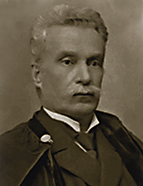

A connoisseur of the nation's artistic treasures, an expert on art education in Portugal, and a historian of comparative art, he was born on 10 February in Cedofeita, the son of businessman José António da Fonseca e Vasconcelos and Maria Rita de Freitas Guimarães. Orphaned at the age of four and following an experience he described as unpleasant in Porto's schools, he left Portugal for Hamburg in 1859, where he received a solid general education, studied singing and solfège, and, in 1862, began his studies in art. During this period, he visited most of Germany, Denmark, France and England. He returned to Portugal in 1865, aged 16, with a degree in Philosophy and, thanks to his family fortune, no financial constraints.
In order to enrol at the University of Coimbra, he undertook preparatory studies but became disillusioned with the teaching methods. The Franco-Prussian War puts the brakes on his desire to return to Germany. Since returning to Portugal, he has felt a withdrawal from the studies he had begun in Germany — in the face of a society he describes as lacking in principles, seriousness and ideals. Transported to a new political, intellectual and artistic milieu, throughout his life he kept a prudent distance from political circles, which he attacked with fierce independence in moments of public intervention. The "scientific and literary way" (Albrecht Dürer..., 1877, p. IX) of thinking that he carries over from his German education is used with a strictness that is hardly in keeping with the rarely cultured dilettantism he will encounter. In this new environment, it was only the artistic world that truly captivated him, as he remained in Coimbra, driven by the sensations and curiosities evoked by the buildings and works of art around him.
A representative of the unyielding desire to position Portugal within the European artistic arena and to value its monumental heritage, in opposition to the "nationalist monomania" (Joaquim de Vasconcelos, 1929, p. 125), his dedication was evident early on in his numerous works. A writer, researcher, educator, tireless traveller, lecturer, publicist, museologist, bibliophile, and professor (once his financial resources were exhausted), he viewed the scholarly study of art as serving the dissemination of popular artistic traditions. He fosters a deep approach to cultural heritage, valuing works of art and monuments through the lens of their influences and historical context, rather than viewing them as mere trophies for the aristocratic classes to admire and keep alive as symbols of their own cultured status.
This work is financed by national funds through FCT - Foundation for Science and Technology, I.P, in the scope of the projects UIDB/04311/2020 and UIDP/04311/2020.
